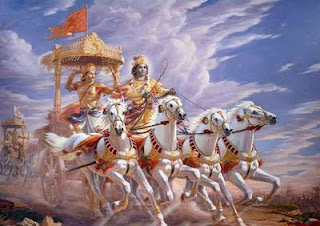ONCE the sage Markandeya came to see the Pandavas. Yudhishthira happened to talk of the virtues of the fair sex and said: "What greater wonder is there in this world than the patience and the chastity of woman? She gives birth to a child after cherishing it in her womb as dearer than life itself. She brings it into the world inpain and anxiety and thence forward her one thought is for its health and happiness. Large hearted and forgiving, a woman forgives and continues to love even a wicked husband who neglects and hates and subjects her to all sorts of miseries. How strange!" Hearing this Markandeya told him a sacred story. There was once a brahmana, named Kausika who observed his vow of brahmacharya. with great steadfastness and devotion. One day, he sat under a tree reciting the Vedas. A crane, perched on the top of the tree, defiled his head with its droppings. He looked up at it, and his angry look killed the bird and it fell down dead. The brahmana was pained when he saw the dead bird lying on the ground. How frightful it would be if wishes fulfilled themselves, if each hasty or angry wish took effect at once! How much there would be to regret or repent afterwards! It is lucky for us that wishes depend onoutward circumstances for accomplishment, since that saves us from much sin and sorrow.
Kausika sorrowed that the evil thought that passed in his mind in a moment of anger had killed an innocent bird. Some time later, he went as usual to beg alms. He stood before the door of a house to receive his dole. The housewife was cleansing utensils at that time. Kausika waited in the hope that she would attend to him after her work was over. In the meantime the master of the house returned, tired and hungry, and the wife had to attend to his wants, wash and dry his feet and serve him with food. In this preoccupation she seemed to have forgotten the mendicant waiting outside. After her husband had been cared for and fed, she came out with alms to the mendicant. She said: "I am sorry to have kept you waiting long. Pardon me." Kausika, burning with anger, said: "Lady, you have made me wait for such a long time. This indifference is not fair." The woman told the brahmana: "Best of brahmanas, kindly do forgive me. I was serving my husband and hence the delay." The brahmana remarked: "It is right and proper to attend on the husband, but the brahmana also should not be disregarded. You seem an arrogant woman." She said: "Be not angry with me and remember that I kept you waiting only because I was dutifully serving my husband. I am no crane to be killed by a violent thought and your rage can do no harm to the woman who devotes herself to the service of her husband." The brahmana was taken aback. He wondered how the woman knew of the crane incident. She continued: "O great one, you do not know the secret of duty, and you are also not aware that anger is the greatest enemy that dwells in man. Forgive the delay in attending to you. Go to Mithila and be instructed in the secret of good life by Dharmavyadha living in that city." The brahmana was amazed. He said: "I deserve your just admonition and it will do me good. May all good attend you." With these words he went to Mithila. Kausika reached Mithila and looked for Dharmavyadha's residence, which he thought would be some lonely hermitage far from the noise and bustle of common life.
He walked along magnificent roads between beautiful houses and gardens in that great city and finally reached a butcher's shop, in which was a man selling meat. His amazement was great when he learnt that this man was Dharmavyadha. The brahmana was shocked beyond measure and stood at a distance in disgust. The butcher suddenly rose from his seat, came to the brahmana and inquired: "Revered sir, are you well? Did that chaste brahmana lady send you to me?" The brahmana was stupefied. "Revered sir, I know why you have come. Let us go home," said the butcher and he took the brahmana to his house where he saw a happy family and was greatly struck by the devotion with which the butcher served his parents. Kausika took his lessons from that butcher on dharma, man's calling and duty. Afterwards, the brahmana returned to his house and began to tend his parents, a duty, which he had rather neglected before.
The moral of this striking story of Dharmavyadha so skillfully woven by Vedavyasa into the Mahabharata, is the same as the teaching of the Gita. Man reaches perfection by the honest pursuit of whatever calling falls to his lot in life, and that this is really worship of God who created and pervades all. (Bhagavad Gita, XVIII, 45-46)
The occupation may be one he is born to in society or it may have been forced on him by circumstances or be may have taken it up by choice. But what really matters is the spirit of sincerity and faithfulness with which be does his life's work. Vedavyasa emphasizes this great truth by making a scholarly brahmana, who did not know it, learn it from a butcher, who lived it in his humble and despised life.
Share this article with your Network :
Share this article with your Network :


No comments:
Post a Comment